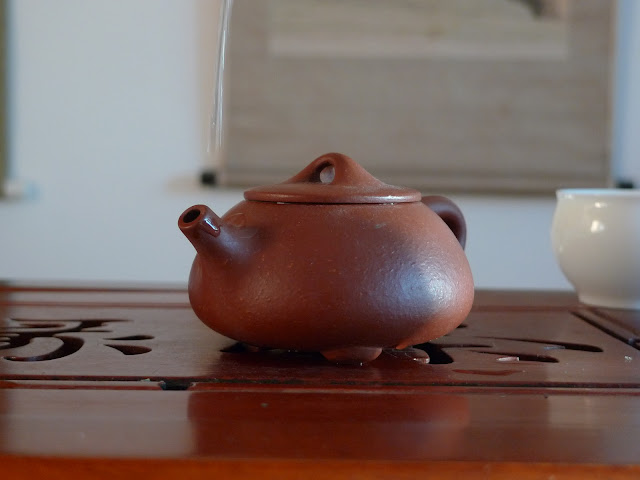This is a continuation of young Guan Zi Zai series. As with young Indiana Jones, it is probably not as good as older, classical production. But, opposed to young Indiana Jones, sheng matures on its own.
And a progression of this tea is obvious, drinking it right after its 2011 version. It seems to be from the same, or very similar material. Many very young shengs taste similar and some of them become bad and some of them become good. To know how young sheng will develop may be a big money saver. And it seems that this GZZ production develops very nicely.
The cake is not as shiny as the 2011 version, but it is still rather nice. It smells young, but more interesting.
It is rather lightly pressed, it goes apart easily:
The evening is to blame for its more aged look - it is still rather green actually.
The liquor confirms its greenness:
I think that it looks like standard 2010 un-post-processed sheng. The liquor is clear and nice. I did not notice any weirdness from possible postprocessing, which immediately puts this tea above the 2011 cake. The lighter color suggests so too (when these teas are brewed using the same amount and method, the 2011 is noticeably darker).
The taste is nice. It is still too rough to make this an everyday drinker to me, but it is good. Hmm, actually, if I had to drink every tea I labelled "everyday" every day, I would die...
The taste is powerful, slightly heavier than in the 2011 and much more diverse. And more Jingmai typical. It is acidic and slightly bitter, but it is fruity (red berries mostly) and not so much floral. Do not confuse acidity with sourness - this tea is not sour. There is plenty of taste aspects to become better with age and I believe they will - the strength is there. Now, it reminds me of young burgundy wine (except that burgundy gives me stomach ache and this tea does not) in character - not as thick, full and rich as Bordeaux (or Yi Wu, if we get back to tea), but pretty intensive anyway.
The aftertaste is long and pleasant. Stronger hui gan would be welcome, but it is not bad.
Cha qi is strong and energizing.
I liked this tea. I think that in a year, it may become very enjoyable. The price seems good to me, although people who have more contacts in China could probably get similar quality at lesser price (I am afraid that in case of Guan Zi Zai, one pays for its renowned previous production a bit). But at $16,50, this is definitely a nice material with (hopefully) good aging potential.

















